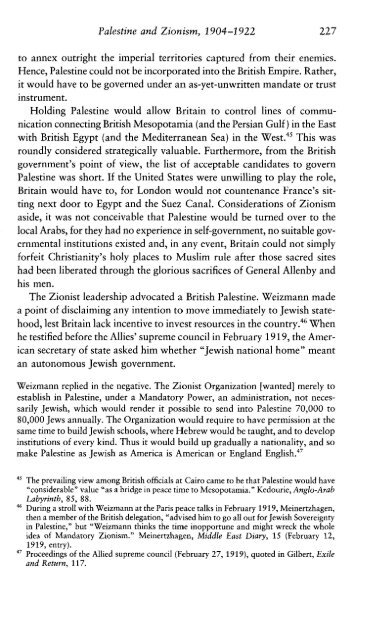Churchill, Palestine and Zionism, 1904-1922 - Douglas J. Feith
Churchill, Palestine and Zionism, 1904-1922 - Douglas J. Feith
Churchill, Palestine and Zionism, 1904-1922 - Douglas J. Feith
Create successful ePaper yourself
Turn your PDF publications into a flip-book with our unique Google optimized e-Paper software.
<strong>Palestine</strong> <strong>and</strong> <strong>Zionism</strong>, <strong>1904</strong>-<strong>1922</strong> 227<br />
to annex outright the imperial territories captured from their enemies.<br />
Hence, <strong>Palestine</strong> could not be incorporated into the British Empire. Rather,<br />
it would have to be governed under an as-yet-unwritten m<strong>and</strong>ate or trust<br />
instrument.<br />
Holding <strong>Palestine</strong> would allow Britain to control lines of communication<br />
connecting British Mesopotamia (<strong>and</strong> the Persian Gulf) in the East<br />
with British Egypt (<strong>and</strong> the Mediterranean Sea) in the West. 45 to annex outright the imperial territories captured from their enemies.<br />
Hence, <strong>Palestine</strong> could not be incorporated into the British Empire. Rather,<br />
it would have to be governed under an as-yet-unwritten m<strong>and</strong>ate or trust<br />
instrument.<br />
Holding <strong>Palestine</strong> would allow Britain to control lines of communication<br />
connecting British Mesopotamia (<strong>and</strong> the Persian Gulf) in the East<br />
with British Egypt (<strong>and</strong> the Mediterranean Sea) in the West. This was<br />
roundly considered strategically valuable. Furthermore, from the British<br />
government's point of view, the list of acceptable c<strong>and</strong>idates to govern<br />
<strong>Palestine</strong> was short. If the United States were unwilling to play the role,<br />
Britain would have to, for London would not countenance France's sitting<br />
next door to Egypt <strong>and</strong> the Suez Canal. Considerations of <strong>Zionism</strong><br />
aside, it was not conceivable that <strong>Palestine</strong> would be turned over to the<br />
local Arabs, for they had no experience in self-government, no suitable governmental<br />
institutions existed <strong>and</strong>, in any event, Britain could not simply<br />
forfeit Christianity's holy places to Muslim rule after those sacred sites<br />
had been liberated through the glorious sacrifices of General Allenby <strong>and</strong><br />
his men.<br />
The Zionist leadership advocated a British <strong>Palestine</strong>. Weizmann made<br />
a point of disclaiming any intention to move immediately to Jewish statehood,<br />
lest Britain lack incentive to invest resources in the country.46 When<br />
he testified before the Allies' supreme council in February 1919, the American<br />
secretary of state asked him whether "Jewish national home" meant<br />
an autonomous Jewish government.<br />
45 This was<br />
roundly considered strategically valuable. Furthermore, from the British<br />
government's point of view, the list of acceptable c<strong>and</strong>idates to govern<br />
<strong>Palestine</strong> was short. If the United States were unwilling to play the role,<br />
Britain would have to, for London would not countenance France's sitting<br />
next door to Egypt <strong>and</strong> the Suez Canal. Considerations of <strong>Zionism</strong><br />
aside, it was not conceivable that <strong>Palestine</strong> would be turned over to the<br />
local Arabs, for they had no experience in self-government, no suitable governmental<br />
institutions existed <strong>and</strong>, in any event, Britain could not simply<br />
forfeit Christianity's holy places to Muslim rule after those sacred sites<br />
had been liberated through the glorious sacrifices of General Allenby <strong>and</strong><br />
his men.<br />
The Zionist leadership advocated a British <strong>Palestine</strong>. Weizmann made<br />
a point of disclaiming any intention to move immediately to Jewish statehood,<br />
lest Britain lack incentive to invest resources in the country.46 When<br />
he testified before the Allies' supreme council in February 1919, the American<br />
secretary of state asked him whether "Jewish national home" meant<br />
an autonomous Jewish government.<br />
Weizmann replied in the negative. The Zionist Organization [wanted] merely to<br />
establish in <strong>Palestine</strong>, under a M<strong>and</strong>atory Power, an administration, not necessarily<br />
Jewish, which would render it possible to send into <strong>Palestine</strong> 70,000 to<br />
80,000 Jews annually. The Organization would require to have permission at the<br />
same time to build Jewish schools, where Hebrew would be taught, <strong>and</strong> to develop<br />
institutions of every kind. Thus it would build up gradually a nationality, <strong>and</strong> so<br />
make <strong>Palestine</strong> as Jewish as America is American or Engl<strong>and</strong> English. 47<br />
Weizmann replied in the negative. The Zionist Organization [wanted] merely to<br />
establish in <strong>Palestine</strong>, under a M<strong>and</strong>atory Power, an administration, not necessarily<br />
Jewish, which would render it possible to send into <strong>Palestine</strong> 70,000 to<br />
80,000 Jews annually. The Organization would require to have permission at the<br />
same time to build Jewish schools, where Hebrew would be taught, <strong>and</strong> to develop<br />
institutions of every kind. Thus it would build up gradually a nationality, <strong>and</strong> so<br />
make <strong>Palestine</strong> as Jewish as America is American or Engl<strong>and</strong> English. 47<br />
45 The prevailing view among British officials at Cairo came to be that <strong>Palestine</strong> would have<br />
"considerable" value "as a bridge in peace time to Mesopotamia." Kedourie, Anglo-Arab<br />
Labyrinth, 85, 88.<br />
46 During a stroll with Weizmann at the Paris peace talks in February 1919, Meinertzhagen,<br />
then a member of the British delegation, "advised him to go all out for Jewish Sovereignty<br />
in <strong>Palestine</strong>," but "Weizmann thinks the time inopportune <strong>and</strong> might wreck the whole<br />
idea of M<strong>and</strong>atory <strong>Zionism</strong>." Meinertzhagen, Middle East Diary, 15 (February 12,<br />
1919, entry).<br />
47 Proceedings of the Allied supreme council (February 27, 1919), quoted in Gilbert, Exile<br />
<strong>and</strong> Return, 117.


